“In the New Testament,” said Arnold Neufeldt-Fast, who ran unsuccessfully for the office of mayor of the Town of Whitchurch-Stouffville, Ont., on Oct. 27, “the state is understood as part of God’s good ordering function in the world—but it is not the centre of God’s purposes in history; that distinction belongs to the church. The confession of Christ relativizes in important ways loyalty to any one configuration of state, to any leader or party.”
In positing that view of the state, Neufeldt-Fast, 50, an ordained member of Community Mennonite Church in Stouffville and an associate professor of theology at Tyndale Seminary, Toronto, represents a shift in the traditional biblical teaching on the Christian’s relationship to the state as articulated by such theological luminaries as the late Guy Hershberger in War, Peace and Nonresistance and John Howard Yoder’s Politics of Jesus in the mid- to late 20th century.
Hershberger, who held to a two-state kingdom theology, and Yoder, who moved the goalpost to one of nonviolent witness to the state but not participation in it, had been pretty much the standard position of the Mennonite church regarding the holding of public office. That goalpost was moved even further, though, by James Reimer, the late Canadian theologian, in his Christians and War, who believed “Christians should support policing, as a function in the secular order, even though the threat of lethal force may occasionally be necessary.”
It seems that Reimer’s position is echoed by all of the Mennonites interviewed by Canadian Mennonite across Canada who recently sought public office in Manitoba and Ontario, who are running in next year’s federal election, or who have served for many years, such as Carl Zehr, 69. Recently retired after 17 years as mayor of Kitchener, Ont, Zehr, a member of Erb Street Mennonite Church, Waterloo, said, “My belief of peace and peacemaking has been instrumental in helping me bring many diverse positions on issues to an amicable and acceptable resolution.”
As to the matter of policing, Zehr said that, “while I [did] sit on the [Waterloo Region] council that funds the police service, the council is prohibited by law in directing any matters of police force.” He did take an oath of office, though, to “uphold the laws of Canada and the province, but obviously individuals will bring their personal beliefs to each situation and may sometimes be in the minority.”
Zehr said he was conflicted when he had to lay a wreath at the cenotaph each Remembrance Day on behalf of all the people of Kitchener. “The first year I did this, I was also asked to speak,” he said, “and I chose to speak about ‘peace,’ rather than war. That may be why I wasn’t asked to speak again.”
And even in the United States, where the Hershberger/Yoder influence has been more keenly felt, there is movement towards a more inclusive view of faith and politics. The former editor of The Mennonite, Everett Thomas, served on the Goshen, Ind., city council for 23 years, as do many other Goshen Mennonite/Church of the Brethren members, such as Allan Kauffman, Goshen’s long-time mayor. “These persons take seriously Jeremiah 29:7, which says, ‘Seek the welfare of the city where I have sent you . . . and pray to the Lord on its behalf, for in its welfare you will find your welfare’,” said Leonard Gross, a retired historian from Goshen.
Neufeldt-Fast, who said he was heavily influenced by Yoder’s Politics of Jesus, said this also “raised my awareness of the socio-political dimensions of the gospel. I am deeply convinced that Jesus’ message and ethic was neither ahistorical, meant only for the world still to come, nor simply for a faithful minority. Rather, they are relevant to questions of social ethics today, including the political questions with which we wrestle even at the municipal level.”
Neufeldt-Fast’s political dream was to “make Stouffville the most walkable, bikeable small town in Ontario.” As a candidate, he sought to ensure good transit for the youth, elderly and those with marginal income, because, he said, “it is good for the air we breathe, an antidote to traffic congestion, and it addresses the needs of more marginal members of the community.” His platform also called for an environmental advisory council, championing the town library, encouraging the arts and paying closer attention to heritage, and to promoting affordable housing and economic development while “standing with the poor.”
Another Community Mennonite member, Jane Philpott, 53, a medical doctor for 30 years, is running next year on the Liberal ticket to become the Member of Parliament in the federal riding of Markham-Stouffville, which is populated by a large number of new Canadians. “Having listened to people as a doctor as to health factors determined by education, employment and income, I believe I can now accomplish the most good by influencing public policy through political leadership,” she said. (See a Nov. 2015 update: 'Philpott named new Health Minister.')
As to how her Anabaptist core beliefs would influence her political work, she said the values of generosity, forgiveness, reconciliation, peace, looking out for the interest of others and respect for others “are woven into the fabric of my character and should always influence my thought processes, decisions and actions.” She said her faith community helps her by “being a place of refuge and restoration.”
Also in Ontario, Sandy Shantz, 57, moderator of Mennonite Church Eastern Canada and a member of St. Jacobs Mennonite Church, said she had no plans for any “big-sword” decisions in her run for mayor of the Township of Woolwich, which she won on Oct. 27. Her hope, she said, is to “instill a respect for our many volunteers, staff and councillors; explore partnerships with other levels of government, business and residents; listen to constituents and, when issues arise, to take the many opinions and data, to help guide council in putting together the big picture so we can make wise decisions.”
“Isn’t it kind of subversive for a citizen of God’s kingdom to infiltrate the realm of secular politics?” she asked rhetorically when answering the question of how she would apply “kingdom ethics” to her position. “I will lean on God for guidance as the issues arise,” she said. “I tend toward solutions that encourage cooperation, rather than confrontation.”
In Manitoba, Melvin Klassen, 73, mayor of Altona for the past 12 years, was acclaimed for a fourth term on Oct. 22 in a town heavily populated by Mennonites, but which, he said, is changing by “ethnic groups bringing in new ideas and values which the community is largely accepting.” He said the mundane issues of “the height of fences, speed zones, lot sizes, drainage and new development do not need to be viewed from a certain political or religious perspective.” But even in the more ethical issues, such as Sunday shopping or the opening of a liquor store, he has tried not to push his views, but to make them matters of personal choice.
As to using force to maintain order, Klassen said he feels strongly that those residents who insist on hurting others have to be contained by a police force to “allow our society to feel safe,” and that “the police and army are there to carry out the policies of democratically elected representatives.”
In nearby Steinbach, Chris Goertzen, 40, was also acclaimed on Oct. 22 for his third term as mayor of the city. Having gotten his po-litical training as a councillor for four years prior, and following in the footsteps of his father, who was a councillor for 26 years, he sees his role as an Anabaptist Christian as definitely tending to the “welfare of the city.” His official roles were supplemented by a lengthy history of community service with his involvement in the Steinbach Arts Council and Ten Thousand Villages.
Goertzen takes particular pride in improving the city park and making its services available to all residents free of charge, and for working with Theresa Oswald, the provincial health minister, in getting a new emergency room at the local Bethesda Hospital. He said his training at the University of Montreal helped broaden his view of Canadian culture as well as to improve his French language skills.
He said his home congregation, Grace Mennonite Church, with its 252 members, is fully supportive of his role as mayor, with many of them saying they are praying for him in his political role. With his brother, Robert, he also owns a specialty grocery store and café in town that has become a favourite among the citizens of Steinbach.
One province west in Saskatchewan, Charlie Clark, 40, who grew up in the United Church but married into the Mennonite faith and attends Osler Mennonite Church, has been a city councillor for Ward 6 in Saskatoon for eight years. He said he ran for the position in a city that “was dominated by more conservative thinking and in need of ‘fresh blood’ for more progressive ideas in the midst of debates about tackling urban sprawl, racism, homelessness, relations between the Saskatoon Police Service and first nations community, kids not in school, environmental sustainability and more.”
Clark said that his exposure to Anabaptism has influenced his role in his political decision-making, maintaining the belief that the “best solutions emerge from bringing people of different worldviews and backgrounds together around a problem to develop a path forward.”
“As a member of the Board of Police Commissioners, I advocate for any strategy or intervention that seeks to de-escalate conflict with words, rather than weapons,” Clark said, adding that he is pushing for the idea that the primary role of the police service is to “keep the peace by maintaining strong relationships within the community, as opposed to a ‘force’ that positions itself separate from the community and intervenes only to overpower.” (For a Dec. 2016 update on Charlie Clark see “Making room for the politics of hope.”)
In the northern Saskatchewan community of Spruce Home, Ray Funk, a member of Grace Mennonite Church in Prince Albert, served one term as an NDP Member of Parliament for Prince Albert from 1988-93. Motivated to get into politics by the candidacy of Tim Friesen for the NDP in Rosthern, and the leadership of David and Stephen Lewis in Ontario, he has been active in politics for some 20 years, running unsuccessfully in 1997 and 2000.
Funk said he was somewhat surprised by the number of Mennonites across the country who interacted with him on a wide variety of issues, many of them seeming to feel that he was a kindred spirit. “And I stayed in close contact with Bill Janzen in the MCC Ottawa office, coming to value his wisdom and experience, and considering him the single most influential person in shaping my work.”
Recognized as a pacifist for his work in the House of Commons, Funk was validated in his belief by his colleague, Ian Waddell, who said Funk had spent his life “fighting for peace.” Funk had several opportunities to bring his beliefs to bear on legislation, such as his introduction of the Peace Trust Fund and participation in the Gulf War debate.
He championed the work of Mennonite Central Committee on the Hill and, through Janzen, brought that perspective to immigration legislation and international development. In the area of restorative justice, he said he was an advocate for women in the now-closed Kingston (Ont.) Penitentiary, Canada’s Indigenous Peoples, and for refugees in search of a home.
As to the tension of the two-kingdom theology, Funk said, “This tension exists in virtually all walks of life and needs to be an ongoing matter of discernment, including study, prayer and the interaction with a faith community.”
In British Columbia, Dave Loewen, 65, a retired high school teacher/administrator and a member of Level Ground Mennonite Church, is finishing his third three-year term as a city councillor in Abbotsford. Like Mel Klassen in Manitoba, he said his political role is to address such mundane issues as variances, bylaws and the delivery of everyday services like water, sewer and roads to residents.
But he also has opportunity to address such social issues as homelessness, providing housing for single moms with children and for recovering addicts, all this with the support of senior government and private partners. He said he feels badly, however, that efforts to provide a “housing-first” model facility for Abbotsford’s downtown homeless failed to get council approval, “squandering a golden opportunity to address the issue in some small measure, but also relinquishing any shred of moral authority to address the issue in the public forum.”
Since Abbotsford has a high percentage of Christians and those of other faiths who share his spiritual values, Loewen doesn’t find it difficult to speak out on issues such as allowing zoning for slot machines in Abbotsford’s bingo hall. “My position from the start was that the potential social costs were too great to ‘gamble’ on the question,” he said, “primarily because those of low socio-economic standing are known to spend their money on slots—the people least able to afford it.” In the end, council approved the slot machines by a 5-4 margin.
In such highly politicized and publicized issues, Loewen said, “my task is to act as transparently and with as much honesty and integrity as possible, to rebuild any semblance of trust. It’s at times like this that I remind myself of the words in Micah 6:8. Beyond that, I trust entirely in God’s leading and pray for wisdom as I apply those words in my deliberations.”
Perhaps the most cogent reason for an Anabaptist Christian getting directly involved in politics was articulated by Rene de Vries, 49, also a member of Community Mennonite in Stouffville, who withdrew his bid for a city council seat in August: “The reason I want to be involved in the political process is to have a say in how decisions in the larger world beyond my household are being made, mainly because I often see so many wrong decisions that would benefit from a different approach . . . war and peace issues; proper environmental management of groundwater, my area of expertise; and cooperation versus polarization.”
Thus, Mennonites in Canada at least have come full circle from being content with only “witnessing” to the government, to full participation in seeking the welfare of the city to which they are sent (Jeremiah 29.7)
—Posted Nov. 6, 2014, corrected Nov. 19, 2014
See also:
When faith and politics intersect
For discussion: 'Seeking the welfare of the city'
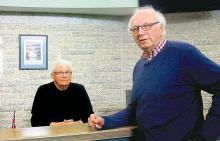
Melvin Klassen, left, is mayor of Altona, Man., while his brother, Ted, serves as a city councillor. ‘Ted, 67, could be forgiven for thinking Melvin, 73, is engaged in some kind of “anything you can do, I can do better” sibling rivalry,’ writes Bill Redekop. ‘When Ted was hired as a teacher at W.C. Miller Collegiate, Melvin soon followed him there, but as principal. When Ted was elected to Altona council, Melvin followed shortly after but—as if to do him one better—ran for mayor.” (Winnipeg Free Press photo by Bill Redekop)


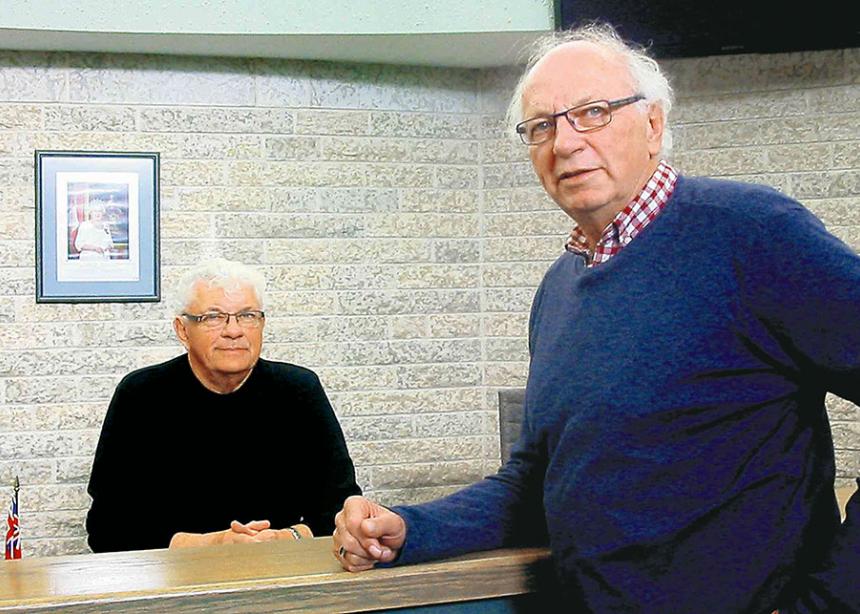

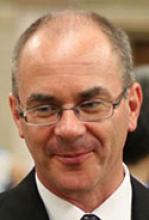
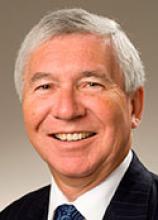
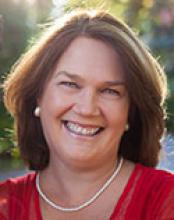



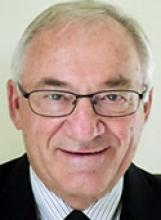


Comments
I want to thank Dick Benner for his excellent editorial to lead into the discussion of Anabaptists engaging political processes. The Anabaptist/Mennonite tradition of influencing the welfare of the countries, cities and towns in which we live by establishing businesses that function according to the principles of our beliefs, by engaging relationships in the community led by these principles, and by speaking to those in political office based on the example of this lived-out faithfulness, I would argue is still the preferred way.
To seek the "peace and prosperity of the city (NIV)" or the "welfare of the city (NRSV)" can be done very intentionally alongside the powers of political office. In fact, this is the missional way - to align with what God is already doing in our neighbourhood and work together with our neighbours to make it a better place. I am okay with the uncertainty of 'no guarantees' of success. When the influence we offer does not have the power of force, but the power of relationships in community, there are no guarantees of getting those in political power to give their attention to our neighbourhood, but we can still brighten the corner where we are. Getting some public dollars and support thrown at a community vision for improving our neighbourhood is a bonus, but not necessary to make a difference.
The compromise of aligning with the powers who have force as an option to get things done, and have the option of seeking to make peace by lethal violence is too great.
Much more could be said, but I will leave it at that for now.
Add new comment
Canadian Mennonite invites comments and encourages constructive discussion about our content. Actual full names (first and last) are required. Comments are moderated and may be edited. They will not appear online until approved and will be posted during business hours. Some comments may be reproduced in print.